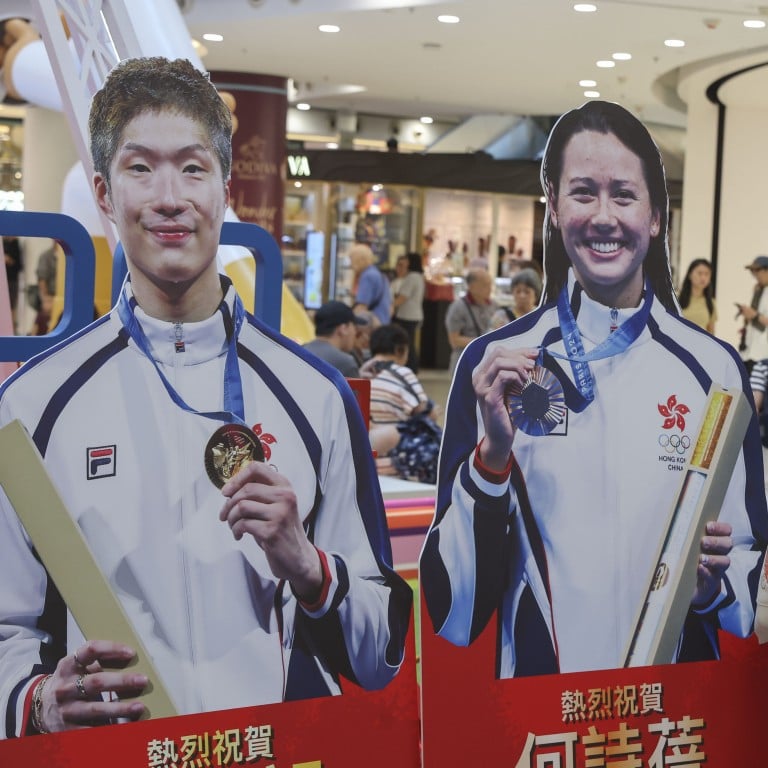
Improve Hong Kong sport with more support for athletes, better governance: Vincent Cheng
- Vice-chairman of Hong Kong Sports Institute outlines 10 policy proposals to improve international performance, create a stronger environment
The Hong Kong government should provide more financial support to athletes to ensure the city can build on the two gold medals and two bronze medals won at the Paris Olympics, lawmakers said on Monday.
Speaking at a press conference, lawmaker Vincent Cheng Wing-shun, who is also vice-chairman of the Hong Kong Sports Institute (HKSI), outlined 10 policy proposals aimed at improving performance on the international stage and creating a stronger sports environment throughout the city.
The proposals included increasing financial support given to athletes and improving the governance of sports associations.
“I hope that more resources can be provided to support elite athletes at all levels,” Cheng said. “One of the key points is to hope that they will have the opportunity to move upwards … We don’t want them to stay at the entry level.”
In Hong Kong, athletes are developed by the sport’s governing body, with the very best graduating to HKSI and representing the city internationally.
Of the 35 athletes who represented the city at the Paris Olympics, 26 were in receipt of HKSI Tier-A* funding, worth between HK$44,500 and HK$50,000 (US$5,700 and US$6,400) each month. Another seven claim between HK$32,730 and HK$$38,540 as Tier-A-supported athletes.
However, entry-level athletes get only around HK$7,000, less than the city’s minimum wage.
Earlier this week, badminton player Lee Cheuk-yiu, who at one point earned HK$7,000 per month, highlighted that many athletes had given up because of the low levels of financial support.
Cheng’s proposals called for a review of this funding, especially for those at the beginning of their sports careers, to ensure they remain competitive and see sports as a viable career.
The institute previously said it would review its training grant in September, with a report to be released early next year and new arrangements to be implemented in April as the organisation sought to increase subsidies and adjust its eligibility threshold.
When asked by the Post if more government funding should lead to the HKSI publicly discussing expectations before events such as the Olympics or the Asian Games, Cheng said it would be “difficult”.
“It’s quite a difficult issue to estimate how many medals we could get, but of course, as HKSI members, we are all trying to get the best results,” he added.
Before the Paris Olympics, the Sports Federation & Olympic Committee (SF&OC) declined to give a medal target, saying it would be “inappropriate”.
Cheng added that he hoped private companies, and not just the government, could also offer financial support to athletes. He said while some athletes benefited from sponsorship and advertisement, there should be a pathway for them to become employees.
He also suggested the government could provide tax exemptions to private institutions that sponsored active or retired athletes’ celebrity endorsements.
The proposals also included a call for an examination of the governance of the city’s National Sports Associations (NSA). The SF&OC previously said it would announce in September corporate governance guidelines to ensure better management.

When asked what should happen to NSAs accused of failing to develop their sports and nurture Hong Kong athletes, such as the governing bodies for swimming, weightlifting, gymnastics and athletics, Cheng did not address the issue directly but said that there was “room for improvement”.
“We know that many people have concerns about sports association governance issues. We do think that they have a lot of [room for] improvement in the future,” he said.
“We hope that there is a fair system for all to become an athlete, and people have equal opportunities to go into the system.”
Other policy proposals included building sports facilities faster than they were currently being built, renewing global events’ broadcast rights, hosting more events in the city and collaboration with the mainland.
Other points Cheng said that needed improvement were sports science and medicine, which would benefit athletes and the elderly.
To encourage members of the public to be more active and get involved with sports, the plan said discounts and vouchers could be offered to the public, while more effort should be put into promoting a healthy lifestyle.

